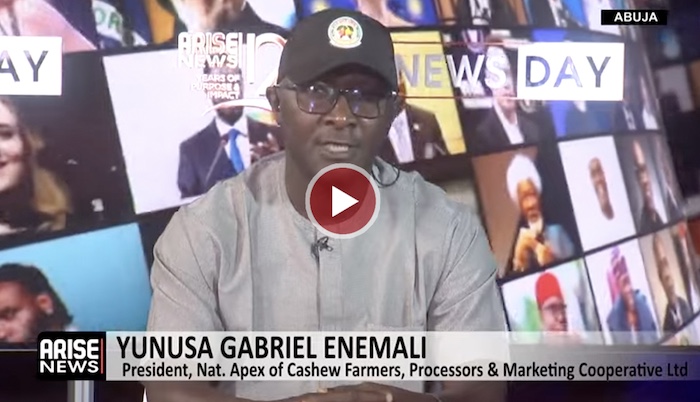
The President of the National Apex of Cashew Farmers, Processors and Marketing Cooperative Limited, Yunusa Gabriel Enemali, has called for urgent reforms to transform Nigeria’s cashew sector from raw nut exports into a value-driven industry.
In an interview with ARISE NEWS on Sunday, Enemali warned that farmers and processors are being shortchanged by middlemen while Nigeria loses billions in potential revenue from cashew’s vast by-products.
“Cashew in Nigeria is an emerging commodity. It’s just less than 20 years that all of this started,” he explained. “Unlike cocoa that has a policy, cashew never had one. So it’s just been garbage in, garbage out.”
Enemali said farmers and processors continue to suffer because the system benefits middlemen. “The middlemen have been distorting the market. They know the buyer, they know the farmer, and they pay the farmer far less. So the farmer is always going back home poorer and poorer while the middleman grows fatter.”
Highlighting cashew’s untapped potential, Enemali said, “Cashew has over 40 products. The most expensive is cashew nut shell liquid, where a litre is between $70 and $90. Cashew also provides carbon credits worth between $150 and $500, yet Nigeria is not benefiting from this.”
According to him, cashew offers environmental, health and economic benefits, and could serve Nigeria’s population of over 200 million without relying on exports. “From the seed to the table, everything about cashew is cash.”
Despite huge farmer investments, he argued that there has been no support or incentives. “Since 2020 COVID-19, including myself, we have been suffering. Farmers kept investing, kept planting, with no support. We borrow, we maintain, we harvest, we sell, and pay back. Nothing to support it.”
Enemali urged the federal government to complete its roadmap for cashew development. “If we have a roadmap, it will metamorphose into policies where we will now have a Nigerian Cashew Board. Other countries have it, where prices are determined so that farmers can benefit.”
On industrialisation, he said the solution lies in deliberate planning. “It doesn’t take anything. If we are serious and deliberate about it, we just need to sit down together. I am a certified cashew master trainer and facilitator. I know what exactly we can do to change the narratives.”
He added that developing rural cooperatives is key. “All the cashew you see today is produced in rural communities. If we empower them with processing facilities, Nigeria won’t need gigantic factories. Rural cooperatives can drive the industry.”
On the federal government’s recent ban on shea nut exports, Enemali said stakeholders should have been consulted. “Concerning the ban of shea nut, I wish all stakeholders in the commodity trade were involved before that decision was taken.”
For him, Nigeria must urgently move from exporting raw cashew to building a processing-driven industry. “We have the land, the people, the market, and the products. What we need is deliberate action to change the narrative.”
Erizia Rubyjeana



